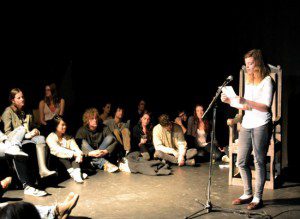
Her name is Kayla Czaga. She’s a young Canadian poet. And last Saturday night during a gala, I attended in Winnipeg, her peers announced she’d won the annual Gerald Lampert Award… Don’t be embarrassed if you’ve never heard of her or the prize. It was awarded by the League of Canadian Poets at the first ever joint conference of the LCP and its new sister association, The Writers’ Union of Canada, of which I’m a member. In fact, she commented on the new relationship between the LCP and TWUC.
“I want to thank this big, new, strange family,” she said. And the 200 or so writers present – poets, novelists, short story writers and non-fiction writers – all laughed and applauded in appreciation.
Indeed, we writers can often be strange and even though we claim to be a family, we actually function more the way Margaret Laurence described us. “Writers are a tribe,” she said. And the great novelist believed it so certainly that, in 1972, she agreed to serve as the interim chair of The Writers’ Union of Canada. A tribe of about 80 Canadian authors gathered annually in those years, with such original delegates as Marian Engel, Rudy Wiebe, Heather Robertson, Andreas Schroeder, Margaret Atwood, Graeme Gibson, Timothy Findley, Pierre Berton and others attending the annual gatherings.
I joined in 1977 when my first non-fiction book was published. More a professional association than a union, TWUC campaigned for better contracts with publishers, more equitable royalties, payment for the public use of our books in libraries, etc. We aspired to make conditions better for writers, while celebrating our tribal communion – words.
“It’s the art that matters,” Guy Gavriel Kay told the tribe on Friday night. Each year, TWUC invites one of its members to present the Margaret Laurence lecture, a talk loosely covering “a writer’s life.” This year in Winnipeg, award-winning fantasy writer Guy Gavriel Kay offered his thoughts about our craft. Noted for his books steeped in Arthurian mythology, Kay explained that every professional writer begins the creative process as an expression of arrogance. “The bedrock of what we do is to invite the world to ‘read me,’” he said. “We say, ‘Give me your time. Give me your attention. And give me some of your money.’”
And by the way, along with the prestige of naming Kayla Czaga winner of the Gerald Lampert Award, the League of Canadian Poets awarded her a prize of $1,000. Czaga won the award for her book “For Your Safety Please Hold On.” I can imagine what some of you are thinking: “A thousand dollars for a bunch of poetry?”
Just last week, The Writers’ Union of Canada published its latest data on the income of writers. The average annual income in this country for a professional writer is $13,000; and compared to 1998, that’s a 27 per cent drop. Not surprisingly, almost half of all professional writers surveyed indicated they must do more to earn a living from what they write. And for a poet, such as Ms. Czaga, it’s even tougher; the survey reported that a female writer earns only 55 per cent of the income a male writer does.
“Making a living as a writer,” said Silver Donald Cameron, an award-winning author, “has become tenuous and precarious.”
I make no excuses for what I do. I expect no handouts for what I do. As a freelance writer, I choose this career path and all its pitfalls. However, in a recent Globe and Mail column, Kate Taylor suggested to compensate for the volatility of a writing income that “a certain base amount of earnings from copyright be tax-exempt” and that those who write “be allowed to average their erratic incomes over several years for tax purposes.” I know from experience that most writers now do most of their own publicity, make their own travel arrangements, and dip into savings to fund speaking tours in order to get their books out there.
The other day when I got back from the Winnipeg conference, I stopped by Blue Heron Books in Uxbridge. Proprietor Shelley Macbeth, some of her staff and a bunch of customers were busy perusing books. Among Shelley’s regular customers, Willa Worsley was in the store; she mentioned she was planning a trip to Newfoundland and wondered what book she might read to introduce her to Newfie lore.
“Marjorie Doyle’s book,” I piped up. I told Willa she could stow “A Doyle Reader: Writings from Home and Away” in her backpack and the stories might even guide her around the island. “In fact, if you time it right, you’ll likely run into Marjorie at the famous Crow’s Nest club in St. John’s.”
“Well, this trip is beginning to look rather attractive,” Willa said.
“We don’t just write books,” I said, trying to make a point. “Authors give readers an experience.”
So, may it be said about any of us who try to master wordsmithing.